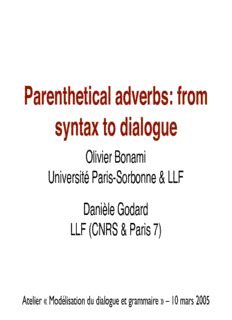
Parenthetical adverbs PDF
Preview Parenthetical adverbs
Parenthetical adverbs: from syntax to dialogue Olivier Bonami Université Paris-Sorbonne & LLF Danièle Godard LLF (CNRS & Paris 7) Atelier « Modélisation du dialogue et grammaire » – 10 mars 2005 Overview • Parenthetical adverbs: heureusement ‘fortunately’, honnêtement ‘honestly’, etc. • Intuitively: they are not part of “what is said”, “the main semantic content”, “the asserted proposition”, etc. • Four issues: • Relation between parentheticality and intonation • Pragmatic status of parentheticals • Semantic types for parentheticals • Parentheticals at the syntax-semantics interface 2 1.1 Parentheticals vs. incidentals Incidentality and parentheticality are independent properties : (1) a. Malheureusement, Paul s’ est comporté comme un unfortunately Paul is behaved like an SE idiot. idiot ‘Unfortunately, Paul behaved like an idiot.’ b. Paul s’ est malheureusement comporté comme un idiot. (2) a. Lentement, la rivère amorçait sa décrue. slowly the river started its decrease ‘Slowly, the river was dropping in level.’ b. La rivière amorçait lentement sa décrue. 3 1 1.2 Varieties of parentheticals • Speech act adverbs: honnêtement ‘honestly’, etc. • Provide a comment on the manner in which the main speech act was executed. • Connectives: donc ‘therefore, so’, etc. • Specify how the current speech act (and/or its content) relates with the current discourse. • Agentives (a.k.a. ‘subject-oriented’): gentiment ‘kindly’, etc. • Comment on an agent’s attitude in bringing about a certain state of affairs. • Evaluatives: heureusement ‘fortunately’, etc. • Provide a comment on the speaker’s appreciation of the semantic content. 4 2 The pragmatic status of evaluative adverbs • Evaluative adverbs… • are not part of the ‘main content’ (2.1) • are not presupposed (2.2) • differ from evaluative adjectives (2.3) • have a special status in dialogue (2.4) • can be assumed by the speaker or another agent (2.5) 5 2.1 Not part of the main content (8) Si Paul va, malheureusement, voir Marie, elle sera furieuse. ‘If, unfortunately, Paul goes and sees Marie, she will be furi- ous.’ ⇔ Si Paul va voir Marie, elle sera furieuse. ‘If Paul goes and sees Marie, she will be furious.’ (9) Qui est bizarrement arrivé à l’heure ? asks: who arrived on time? commits the speaker to: if somebody arrived on time, that’s weird. 6 2 2.2 Not presupposed • Not contested in the same way as presuppositions (15) A: Paul a malheureusement perdu l’élection. ‘Paul unfortunately lost the election.’ B: # C’est faux, je trouve que c’est une très bonne nouvelle. ‘That’s not true, I think it is very good news’. B: C’est vrai, mais moi, je trouve que c’est une très bonne nouvelle ! ‘Yes, but I personally think it is great news!’ (16) A: Paul regrette d’être venu. ‘Paul regrets that he came.’ B: # Oui, mais Paul n’est pas venu ! ‘Yes (he would have regretted that), but Paul did not come!’ 7 3 2.3 Evaluative adverbs vs. adjectives • Adjectives, but not adverbs, presuppose their arg. (18) a. S’il est malheureux que Paul ait vu Marie, il est tragique (18) a. S’il est malheureux que Paul ait vu Marie, il est tragique qu’il l’ait insultée. qu’il l’ait insultée. ‘If, it is unfortunate that Paul met Marie, it is tragic that ‘If, it is unfortunate that Paul met Marie, it is tragic that he insulted her.’ he insulted her.’ ⇒ ‘Paul met Marie.’ ⇒ ‘Paul met Marie.’ (13) a. Si Paul va, malheureusement, voir Marie, elle sera furieuse. (13)‘If, uan. foSrituPnaautlevlya,,PmauallhmeeuertesuMsaermiee, snhte, vwoiilrl bMeafruireio, eulsl.e’ sera furieuse. "⇒ ‘Paul‘Imf,euentsfoMrtaurine.a’tely, Paul meets Marie, she will be furious.’ Proposed relationship between adverb and adjective: "⇒ ‘Paul meets Marie.’ λ (20) unfortunately ≡ p.[p → unfortunate(p)] 8 4 4 2.4 Status in dialogue • Evaluatives are “solitary commitments” of the speaker (21) Participant’s gameboard update when asserting p SPKR-CMT S SPKR-CMT {p} ∪ S ! - - ADDR CMT A ADDR CMT A QUD Q QUD 〈p?〉 ⊕ Q (24) Participant’s gameboard update when uttering malheureuse- ment p SPKR-CMT S SPKR-CMT {p,unfortunately(p)} ∪ S ! - - ADDR CMT A ADDR CMT A QUD Q QUD 〈p?〉 ⊕ Q 9 5 2.5 Who is responsible for the evaluation? • By default, the evaluator is the speaker. • In reported speech contexts, it can be another agent. (26) Marie m’a annoncé que, malheureusement pour moi, je n’avais pas été élu. Je lui ai expliqué que cela m’arrangeait plutôt, vu que je n’avais jamais eu l’intention de prendre le poste. “Marie announced that, unfortunately for me, I hadn’t been elected. I explained that it was fine with me, since I never intended to accept the position.” • Not surprising: a speech report can report all aspects of the illocutionary situation. • We need a unified way to talk about evaluatives 10 6
Description: